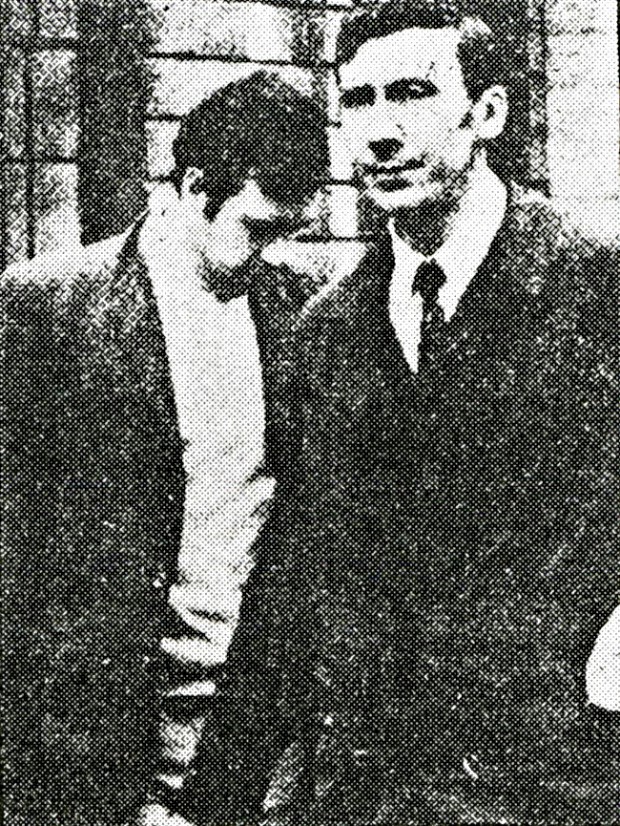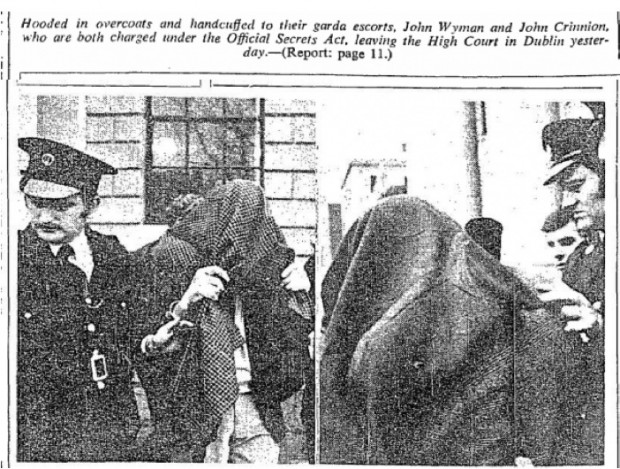20 December 2015
The MI6 Wyman spy network in Dublin

● (Left) John Wyman, escorted by a Special Branchman, leaving Dublin’s Special Court after he was charged under the Official Secrets Act
IN DECEMBER 1972, the extent of the British Intelligence spy network in Ireland and their infiltration of the Garda Síochána was dramatically exposed by the arrest of John Wyman and Patrick Crinnion.
Wyman (alias “Douglas Smythe” and also known as “Michael Teviott”), a member of MI6, the Secret Intelligence Service, was an important cog in the well-oiled machine of British Intelligence in Ireland.
During the 1960s, especially following the beginning of the most recent phase of the struggle, Wyman’s network expanded. He recruited a number of gardaí and Special Branch officers as agents, the most important being Garda Detective Sergeant Patrlck Crinnion.
Crinnion joined the Garda in 1955. He was transferred to Dublin Castle in 1961 and in 1969 was appointed private secretary to the then Head of the Special Branch, Chief Superintendent John P. Fleming, and moved to Garda HQ in the Phoenix Park to control the intelligence section known as C3.
Crinnion was a particularly valuable spy and was ideally placed to supply the British with intelligence on the IRA, the Republican Movement and gardaí. In return for large sums of money, he supplied Wyman with photostat copies of files and information relating to republicans and republican sympathisers.

LITTLEJOHNS
Also in the Wyman network were the Littlejohn brothers.
Keith and Kenneth Littlejohn, two English criminals on the run in Ireland in 1969, made contact with British Intelligence and offered to work for them in return for an amnesty. Their offer was accepted and they were put in contact with “Douglas Smythe” (Wyman) in Dublin.
The Littlejohns' orders were to infiltrate the Republican Movement, kill republican leaders, and carry out operations in the 26 Counties in an effort to discredit the IRA and to force the Fianna Fáil government to crack down on the Movement. They were responsible for numerous bombings and robberies in the 26 Counties which prompted the Minister for Justice, Des O’Malley, to promise tougher action against the IRA.
In November 1972, O’Malley introduced the draconian Offences Against the State (Amendment) Bill before the Dublin parliament and in the early hours of 2 December, as the Bill was being debated in Leinster House, British Intelligence agents exploded bombs in Dublin, killing two people and seriously injuring 127 others. Within hours, the Bill was passed by a large majority.
ARRESTS
On 20 December, the Littlejohns were arrested in London. The following day, Wyman and Crinnion were arrested in Dublin and charged with stealing state secrets.
The reason for the arrest of Wyman and Crinnion is clear: the Fianna Fáil government knew full well that the British agents provocateur, having failed to lay the blame for the Dublin bombs at the door of the IRA, would now resort to political assassination.
After the loss of their two key operatives, the British decided to sacrifice the Littlejohns in exchange for the return of Wyman and Crinnion.
In February, both were tried in camera and sentenced to three months. As they had already been held for that time, both were released and immediately flown to London. The following month, the deal was completed when the Littlejohn brothers were sent to Dublin to stand trial.
MI6 agents John Wyman and Patrick Crinnion were arrested in Dublin on 21 December 1972, 43 years ago this week.
Follow us on Facebook
An Phoblacht on Twitter
Uncomfortable Conversations

An initiative for dialogue
for reconciliation
— — — — — — —
Contributions from key figures in the churches, academia and wider civic society as well as senior republican figures




